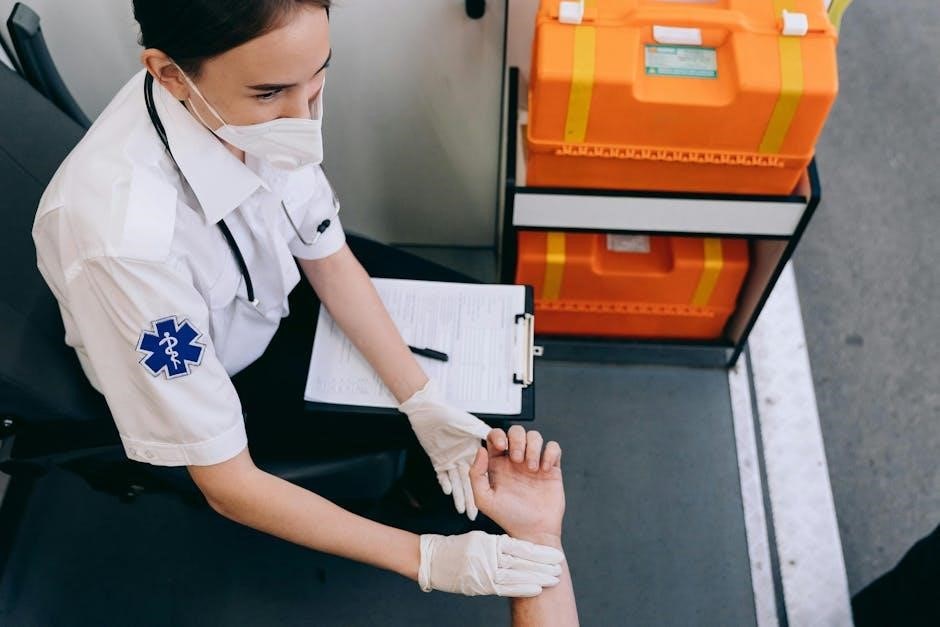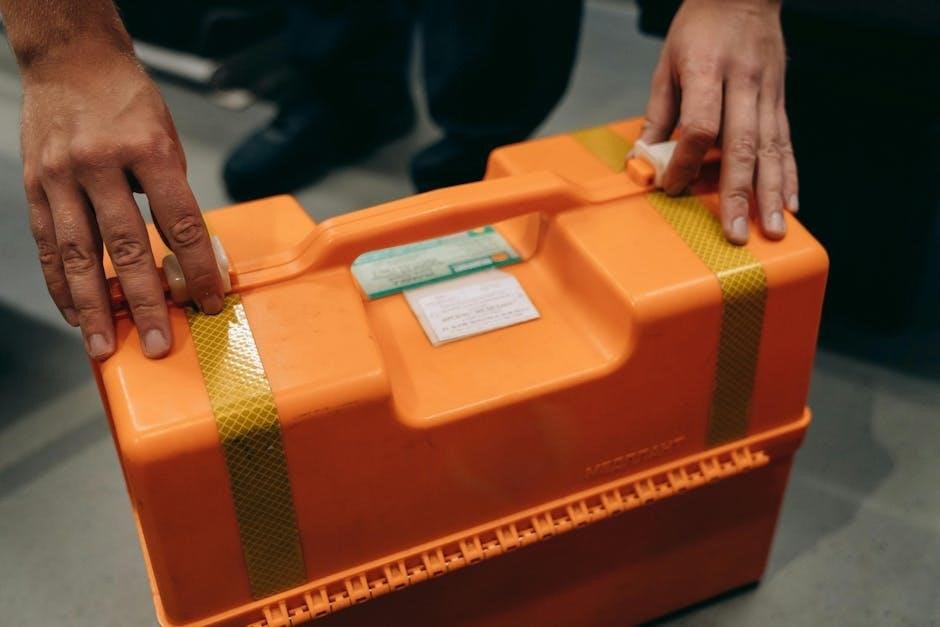First Aid for USMLE Step 3 is a concise‚ high-yield resource designed to help medical graduates excel in the final licensing exam‚ focusing on practical clinical knowledge and case-based decision-making.
Overview of USMLE Step 3 and Its Importance
USMLE Step 3 is the final examination in the United States Medical Licensing Examination series‚ assessing a physician’s ability to apply medical knowledge and clinical skills in an unsupervised setting. It focuses on patient management‚ clinical decision-making‚ and the ability to handle complex cases. Passing Step 3 is a critical milestone for medical graduates‚ as it is required for full medical licensure in the U.S. and is often a key factor in securing residency positions. The exam’s emphasis on practical‚ real-world scenarios ensures that physicians are well-prepared to provide safe and effective patient care independently. Success in Step 3 demonstrates a high level of clinical competence‚ making it a cornerstone of a physician’s career progression.
Role of First Aid in USMLE Step 3 Preparation
First Aid for USMLE Step 3 serves as a comprehensive‚ high-yield study guide tailored to address the exam’s unique challenges. It condenses vast clinical knowledge into concise‚ easily digestible formats‚ focusing on high-probability topics and case simulations. The guide emphasizes practical application‚ mirroring the exam’s real-world focus. By organizing information in a structured manner‚ it helps candidates identify key areas to master‚ ensuring efficient review and retention. Additionally‚ First Aid aligns well with other resources like UWorld‚ complementing them with targeted content. Its portability and concise nature make it an essential tool for residents and graduates preparing for this critical exam‚ aiding them in achieving their goal of obtaining full medical licensure in the United States.

Key Topics Covered in First Aid for USMLE Step 3
First Aid for USMLE Step 3 covers essential clinical topics like emergency medicine‚ patient management‚ pharmacotherapy‚ and ethical considerations‚ ensuring a well-rounded preparation for the exam.
Clinical Case Simulations (CCS)
Clinical Case Simulations (CCS) are a cornerstone of First Aid for USMLE Step 3‚ mirroring real-life patient encounters. These simulations focus on diagnosing and managing complex cases‚ emphasizing time management and decision-making skills. Learners are tasked with ordering tests‚ interpreting results‚ and selecting appropriate treatments‚ fostering a practical understanding of clinical scenarios. The CCS section is designed to align with the exam format‚ helping candidates navigate high-pressure situations efficiently. By practicing these simulations‚ candidates improve their ability to prioritize actions‚ a critical skill for success in both the exam and actual clinical practice. Regular practice with CCS cases ensures readiness for the challenges of Step 3‚ making it an indispensable tool for exam preparation.
Patient Management and Medical Decision-Making
Patient management and medical decision-making are critical components of First Aid for USMLE Step 3‚ focusing on evidence-based approaches to diagnose and treat patients effectively. This section emphasizes the importance of prioritizing patient safety‚ adhering to clinical guidelines‚ and optimizing therapeutic plans. Learners are guided through scenarios requiring nuanced decision-making‚ such as managing chronic conditions‚ handling acute emergencies‚ and addressing comorbidities. Practical strategies for patient communication and shared decision-making are also highlighted. By mastering these skills‚ candidates can deliver high-quality care while navigating complex clinical situations. The content is designed to reinforce logical thinking and efficient problem-solving‚ essential for excelling in both the exam and real-world practice.
High-Yield Clinical Knowledge for Step 3
High-yield clinical knowledge for USMLE Step 3 focuses on essential concepts and frequently tested topics‚ ensuring a targeted approach to exam preparation. This section covers key areas such as pharmacotherapy‚ differential diagnoses‚ and treatment guidelines for common and complex conditions. It emphasizes evidence-based medicine‚ highlighting the most critical information needed for patient care and exam success. Topics include managing chronic diseases‚ acute care scenarios‚ and nuanced clinical presentations. The content is structured to help candidates identify and apply high-yield facts efficiently‚ reinforcing both knowledge retention and clinical application. By mastering this material‚ learners can confidently tackle the exam while developing a robust foundation for real-world patient management.

Study Strategies Using First Aid for USMLE Step 3
Effective study strategies include active learning‚ prioritizing high-yield topics‚ and integrating First Aid with UWorld. Utilize flashcards‚ spaced repetition‚ and regular practice exams for optimal retention and exam readiness.
Time Management and Study Schedules
Effective time management is crucial for success in USMLE Step 3 preparation. Create a structured study schedule‚ allocating specific blocks for CCS practice‚ patient management scenarios‚ and high-yield clinical knowledge review. Prioritize topics based on exam weight and personal weaknesses. Incorporate regular breaks to maintain focus and prevent burnout; Utilize First Aid for quick revisions and reference‚ while dedicating time for in-depth study of complex concepts. Consistency is key; aim to study 6-8 hours daily‚ ensuring a balance between active learning and rest. Regularly review and adjust your schedule to adapt to evolving strengths and areas needing improvement.
Effective Use of Flashcards and Annotated Notes
Flashcards and annotated notes are powerful tools for reinforcing key concepts in USMLE Step 3 preparation. Use flashcards to memorize high-yield facts‚ such as medications‚ doses‚ and clinical guidelines. Annotate your notes with real-life case examples and mnemonics to enhance retention. Review flashcards regularly‚ focusing on weak areas identified through practice exams. Organize notes thematically‚ cross-referencing with First Aid to ensure comprehensive understanding. Active recall through flashcard quizzing strengthens long-term memory‚ while annotated notes provide quick access to critical information during study sessions. Integrate these methods into your daily routine for efficient and effective learning.
Practice Exams and Case Simulations
Practice exams and case simulations are essential for USMLE Step 3 preparation‚ as they mimic real exam conditions and help assess readiness; Regularly taking timed practice exams allows you to identify weak areas and refine your test-taking strategies. Case simulations‚ particularly in CCS (Clinical Case Simulations)‚ require application of clinical knowledge to patient care scenarios. Use First Aid to review high-yield topics after each simulation. Focus on understanding the rationale behind correct answers and common pitfalls. Incorporate flashcards to reinforce concepts identified during practice. Consistent exposure to practice exams and simulations builds confidence and ensures mastery of the clinical decision-making skills required for success on USMLE Step 3.

Additional Resources and Supplements
Supplement your First Aid for USMLE Step 3 with UWorld question banks‚ online forums‚ and flashcards for a comprehensive study approach.
Integrating First Aid with UWorld and Other Materials
Integrating First Aid with UWorld and other materials enhances your study efficiency. Use UWorld for practice questions and First Aid for high-yield notes. Cross-reference topics between both resources to strengthen understanding. Flashcards can reinforce key concepts‚ while annotated notes provide in-depth insights. This combination allows for a well-rounded preparation strategy‚ ensuring both knowledge retention and application in clinical scenarios.
Online Forums and Community Support
Online forums and community support play a crucial role in supplementing your preparation. Platforms like Reddit’s r/USMLE and Facebook groups dedicated to USMLE Step 3 offer valuable insights‚ shared resources‚ and strategies from peers and experienced test-takers. These communities often discuss high-yield topics‚ exam experiences‚ and study techniques‚ providing real-world perspectives. Additionally‚ resources like the Psychological First Aid Field Operations Guide and materials from the National Child Traumatic Stress Network can be shared within these groups‚ offering comprehensive support. Engaging with these forums fosters collaboration‚ reduces isolation‚ and provides motivation‚ making your study journey more effective and less daunting. Utilize these spaces to ask questions‚ share knowledge‚ and stay updated on the latest study trends and materials.

First Aid for USMLE Step 3‚ combined with resources like the Psychological First Aid Field Operations Guide‚ ensures comprehensive preparation‚ leading to exam success and clinical confidence.
Final Tips for Maximizing First Aid for USMLE Step 3 Success
- Integrate the Psychological First Aid Field Operations Guide for enhanced clinical decision-making skills.
- Regularly review temperature checks and medication advice to ensure comprehensive preparation.
- Allocate dedicated time for case simulations and one-best-answer questions to improve exam readiness.
- Utilize flashcards and annotated notes for high-yield topics‚ ensuring efficient study sessions.
- Stay updated with the latest medical guidelines and practice exams to refine your strategy.
- Balance study with mental health to maintain peak performance during preparation.

